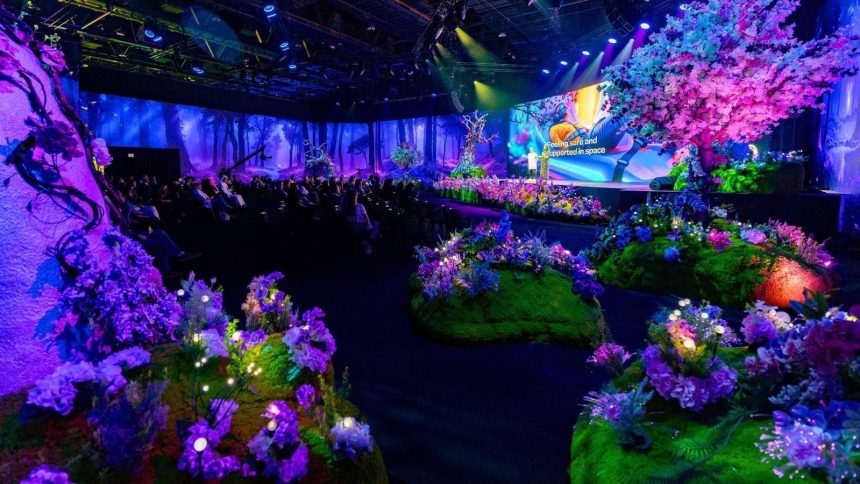XPANSE, a groundbreaking summit held in Abu Dhabi, showcased the transformative potential of converging science, technology, and art. This innovative event brought together a diverse group of industry leaders, researchers, tech pioneers, investors, and artists to explore cutting-edge advancements and imagine a future shaped by interdisciplinary collaboration. Discussions encompassed a wide range of topics, from quantum computing and AI to genomics, embodied intelligence, next-generation materials, and the concept of sentient cities. Notably, XPANSE distinguished itself from traditional tech conferences by placing a strong emphasis on art and playful creativity, offering a glimpse into a future where these seemingly disparate disciplines intertwine to create novel experiences and solutions.
Abu Dhabi provided a fitting backdrop for XPANSE, given its robust innovation ecosystem. The city’s multi-billion-dollar National Innovation Strategy fuels investments in key areas such as blockchain, fintech, renewable energy, and AI, underpinned by research conducted at the government-backed Technology Innovation Institute. The presence of a satellite Louvre museum further underscores Abu Dhabi’s commitment to fostering a vibrant contemporary art scene. This commitment to innovation and creativity has earned Abu Dhabi recognition as the fastest-growing emerging ecosystem in the Middle East and North Africa (MENA) region, according to the 2024 Global Startup Ecosystem Report, with growth driven by robust startup valuations and successful exits.
The convergence of art and science was vividly demonstrated at XPANSE through interactive installations, such as a speculative living alphabet generated by a combination of microalgae colonies and artificial neural networks. This artistic exploration of biological and computational systems exemplifies the summit’s focus on bridging the gap between scientific discovery and creative expression. Beyond showcasing established technologies, XPANSE also provided a valuable platform for early-career scientists, PhD students, and postdoctoral fellows to present their research projects at various stages of development. Some of these projects are already being deployed commercially or undergoing trials, highlighting the summit’s role in accelerating the translation of research into real-world applications.
Among the promising health and MedTech solutions presented at XPANSE were three particularly compelling innovations: Vital Rhythms, iATOSSA, and LaparoSense. Vital Rhythms, a deep learning software, utilizes novel multi-parameter images to assess different stages of heart failure. Unlike traditional electrocardiography (EKG), which is typically confined to medical settings, Vital Rhythms employs a personalized, deep learning-based polar image incorporating patient clinical information. This approach allows for continuous 24-hour monitoring via a wearable device at home, offering a more comprehensive and convenient method of assessment. The AI-powered software identifies critical periods influencing heart failure progression and is already being utilized by patients both in homes and hospitals.
iATOSSA, a smartphone-based application, leverages thermal imaging and AI to provide early risk assessment, monitoring, and self-management tools for breast cancer. Addressing the global challenge of high breast cancer mortality rates and limited early detection tools, iATOSSA combines deep learning models with symptom tracking, medication adherence monitoring, and behavioral data analysis. This comprehensive approach empowers users, both high-risk individuals and survivors, to collect data at home, receive personalized insights, and access support through a user-friendly interface. Developed in collaboration with oncologists and biomedical engineers, iATOSSA aims to improve home-based risk assessment accuracy, disrupt unhealthy behaviors, monitor side effects, and provide personalized self-management guidance through an integrated support bot.
LaparoSense addresses the limitations of minimally invasive surgery (MIS) by enhancing tactile feedback for surgeons. While MIS offers significant advantages, the lack of tactile sensation can compromise precision and surgical outcomes. LaparoSense incorporates soft, microfluidic sensors into the handles of laparoscopic graspers, providing surgeons with a sense of touch. This technology has demonstrated a 30% improvement in task completion time, enabling differentiation between tissue types, detection of hidden lumps within tissue, and accurate identification of tumor locations. Prototyping has shown its ability to measure tissue thickness at various angles while applying consistent force, and the reusable design allows for integration with other surgical grasping instruments. The founders of LaparoSense are currently engaging with major medical technology companies to scale production and bring this innovation to market, with a non-provisional patent application already filed.
These three projects – Vital Rhythms, iATOSSA, and LaparoSense – exemplify the potential of XPANSE to foster innovation and accelerate the development of transformative solutions in healthcare and beyond. By creating a platform for the convergence of science, technology, and art, XPANSE not only showcases cutting-edge advancements but also encourages collaborative exploration and accelerates the translation of research into tangible real-world impact. Abu Dhabi’s commitment to innovation and its thriving ecosystem provide fertile ground for such collaborations, positioning the city as a hub for driving progress and shaping the future of technology, healthcare, and artistic expression.



